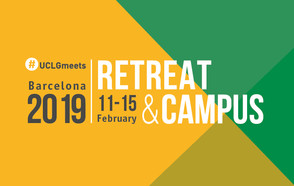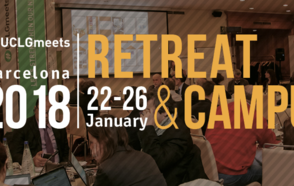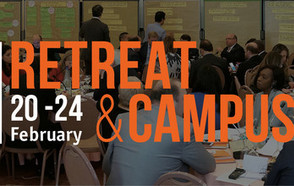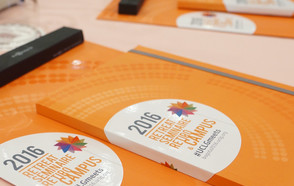
The sixth edition of the Annual Retreat & Campus is taking place in Tangier, from 24 to 28 February 2020.
The 2020 Retreat is focusing on joint programming and the co-creation of the organization’s agenda in the localization decade..Special emphasis is being placed on building synergies through the Waves of Action and shaping the Local4Action Hub.
The first part of the week, Monday to Wednesday, is dedicated to the work of the different parts of the network, including specific workshops. Thursday and Friday includes the Annual meeting of the Global Taskforce, and the Presidency meeting to co-create the future we want.
The Retreat is the occasion to harness the power of our network and continue our work based on the collaboration and achievements of the last few years, as well as increase visibility and impact at all levels.

Social Share: #UCLGMeets
- Follow #UCLGMeets / #CitiesAreListening
- Check out our key moments Day 1 / Day 2 / Day 3 / Day 4 / Day 5
- Visit our Flickr album Day 1 / Day 2 / Day 3 / Day 4 / Day 5
- Watch the interviews Playlist

Programme of the UCLG Annual Retreat and Campus
 DAY 1: 24.02.2020 - Setting the Stage
DAY 1: 24.02.2020 - Setting the Stage
 DAY 2: 25 2.02.2020 - An Equality Driven Movement which Renews Democracy for All
DAY 2: 25 2.02.2020 - An Equality Driven Movement which Renews Democracy for All
 DAY 3: 26.02.2020 - No Action without Localization!
DAY 3: 26.02.2020 - No Action without Localization!
 DAY 4: 27.02.2020 - The Post-Congress era for members and partners
DAY 4: 27.02.2020 - The Post-Congress era for members and partners
 Day 5: 28.02.2020 - Leadership Day #CitiesAreListening
Day 5: 28.02.2020 - Leadership Day #CitiesAreListening

 DAY 1: 24.02.2020 - Setting the Stage
DAY 1: 24.02.2020 - Setting the Stage
The first day of the Retreat was the start to an All-UCLG internal conversation, through an open dialogue and workshops, building on the outcomes of the 2019 World Congress and World Summit in Durban, which consolidated the policies that the World Organization has been promoting within its strategic priorities.
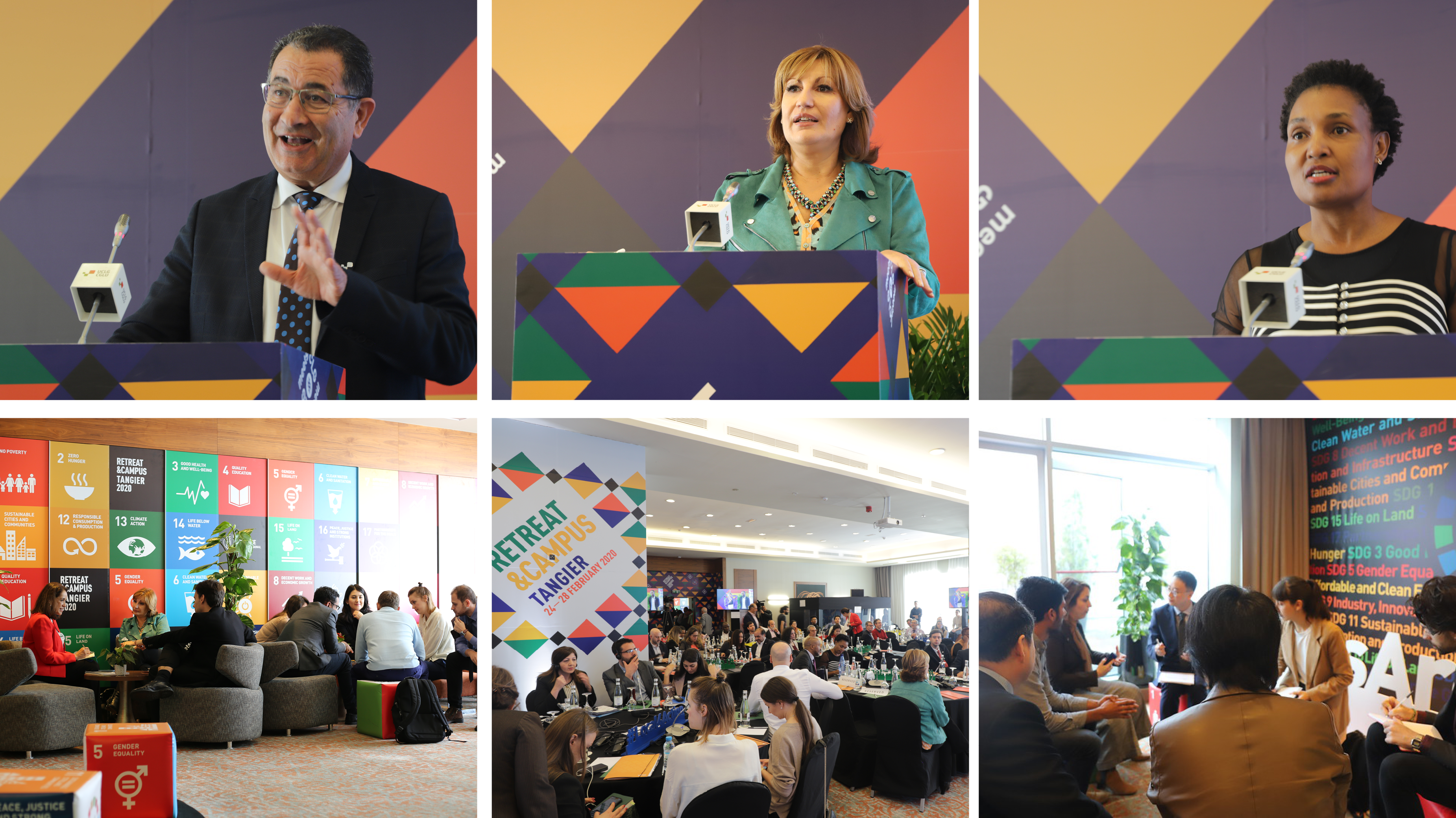
“My aim is to strengthen UCLG 's external alliances; reinforce internal commitments and expand the network; and continue to shape a political agenda that helps local governments meet the challenges of our time.” Mohamed Boudra, President of UCLG, Mayor of Al-Hoceima, President of the Moroccan Association of Mayors (AMPCC)
The inauguration of the Local4Action Hub took place in the morning followed by the meeting of the Committee on Local Economic and Social Development which aligned with the 2020 Work plan and presented the 5th World Forum on Local Economic Development.
“As UCLG we must remind ourselves of the commitment towards human progress and the prosperity of humanity. Our mandate is to maintain, support, and develop cities and local governments” Thembisile Nkadimeng, Mayor of Polokwane, UCLG Co-President and President of SALGA
Throughout the day, our leadership set the scene and presented the Work Plan adopted in Durban, that places the 2030 Agenda at the heart of our actions, and all of the work areas of our World Organization presented their work for the year. Representatives from the Policy, Learning, Research, and Finance teams of the UCLG World Secretariat laid out their priorities for 2020, building on the heritage from Durban, and with an effort to synchronise all of the areas of the World Organization.
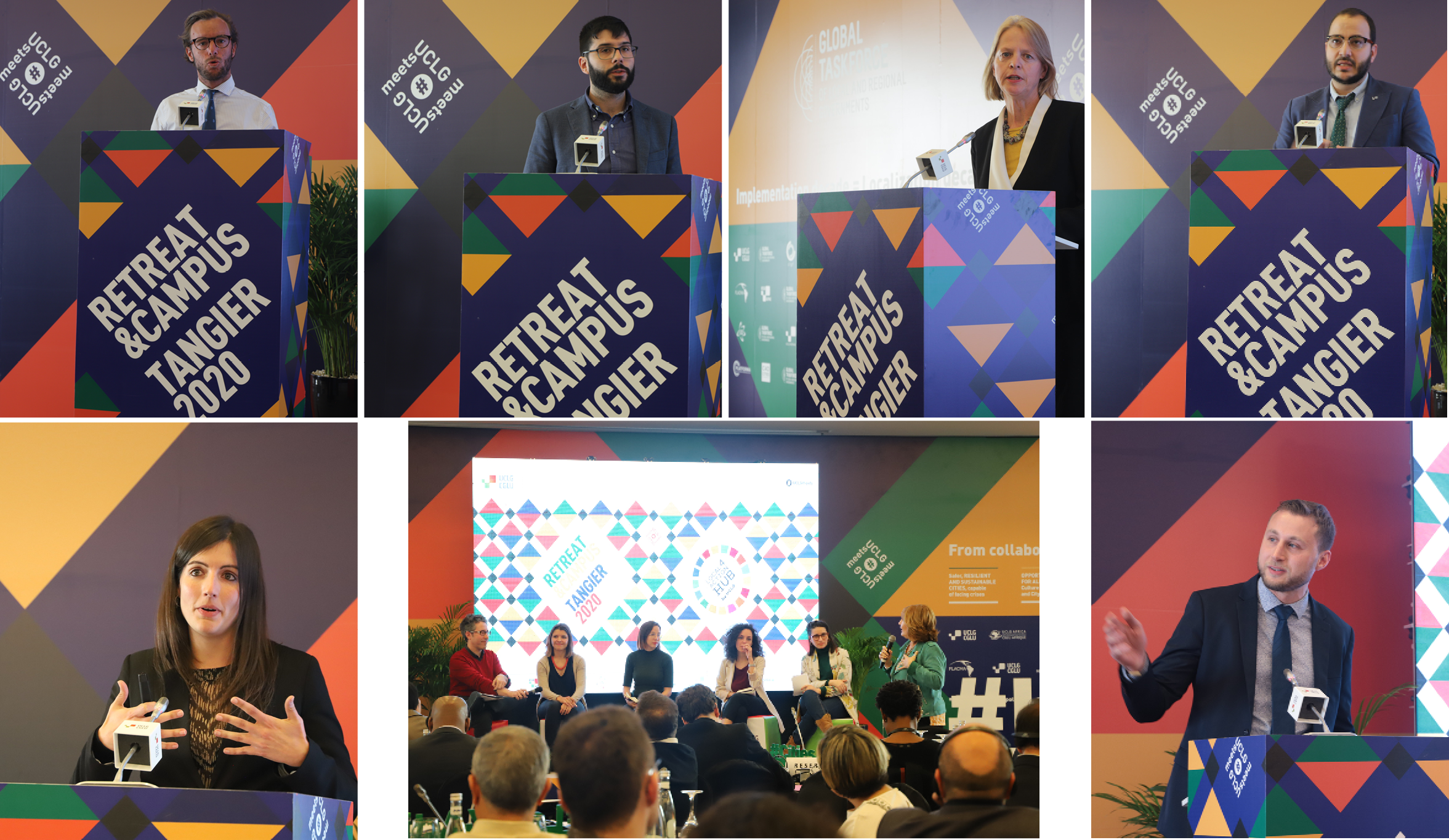
The afternoon continued with the presentation by the different UCLG thematic areas. In an almost all women panel, the need to change the narrative on migration, the transformation that the Right to the City brings at the local level, culture and its key role in the implementation of the global agendas, and the need to localize finance to achieve the global goals were among the key issues discussed. Public space and equal access to the city between genders was also among the topics discussed in the session, with a representative from Metropolis addressing the wave of action on public space.
“The Retreat is not only about the ideas that we share, but it is also about the people. We make the movement. This retreat, the first retreat after the Congress -- it needs to be about the people that make the movement.” Emilia Saiz, Secretary General of UCLG
Democracy, intergenerational dialogue, inequalities, the climate and migration emergencies will find a more prominent space in the agenda during 2020, and this first day of the Retreat has allowed us to set the stage for transforming the collaboration within our Network into synchronization, with parallel sessions on the World Forum on Violence and Territories of Peace, and meetings of the Working group on Territorial Prevention and Management of Crises.

We will come back tomorrow with more #UCLGMeets! Stay tuned!
 DAY 2: 25 2.02.2020 - An Equality Driven Movement which Renews Democracy for All
DAY 2: 25 2.02.2020 - An Equality Driven Movement which Renews Democracy for All
The second day of the Retreat was dedicated to our Durban Legacy and our Strategy as we enter the Implementation Decade, looking at how to renew the policy mandate and ground the key issues into the whole network through various roundtables.
Our work in Local Finance was presented during the day, in a session that discussed our strategy, addressed to ease local and regional governments’ access to finance and enhance their capacities to mobilise resources. The session also served to showcase the experiences of a city as recipient of the pilot International Municipal Investment Fund.
"Unless we see the local governments as the solution regarding implementing environmental policies, our survival on this planet is in trouble. David Jackson, Director of Local Development Finance, UNCDF
The ecological transition is also a question of solidarity. Throughout the session, participants highlighted just how, through joint work, there will be the possibility of accelerating action for a sustainable, resilient planet.
“Cultural ecology plays a crucial role on disaster risk assessments and reduction. We must include cultural heritage and culture. This includes indigenous people and knowledge.” Madelaine Alfelor, Mayor of Iriga, UCLG Treasury
Local Democracy, an issue that has been at the core of our work, and has come back in full force after our Congress in Durban, was also one of the hot topics of the day. Its renewal is considered a key priority for the future of the world, and creating synergies among cities, regions, and the World Organization is essential to enhance local democracy in such an adverse context. 
“We believe in local self government is base for local democracy. We are eager to protect local self-government, and we need the political leadership to do so” Carola Gunnarsson, Mayor of Sala, Vice-President of the Swedish Association of Local Authorities and Regions (SALAR), Incoming Vice-President of UCLG for Europe
The last roundtable of the day, on Equality and Rights, had the goal of synchronising the organisation on tackling inequalities as an integral element of achieving the SDGs. As an equality-driven movement, that believes on the rights-based approach to the city, we consider gender equality, inclusion of migrants, peace culture, housing, non-discrimination as essential to curb inequalities and leave no one behind.
“Inequalities include land and spatial inequalities, equal access to transportation, and other basic services that citizens use on daily basis. We need to structure the dialogue with civil society and stakeholders to bridge the gap between the local level and citizens on inequality.” Thembisile Nkadimeng, Mayor of Polokwane, President of SALGA and Co-President of UCLG.
The Waves of Action, introduced in 2017, were also an important part of the day. In particular, our Wave of Action on Migration was brought to the table, bringin the work done by our Network to transform our narrative into action, to transform the Wave of Action into a coordinated commitment among the entire network to be able to bring about changes in international policy.
Local Governments Associations are crucial for the coordination of the localization process and, in particular, for the reporting of local action. At the Session on LGAs, the LGA Chart was introduced with the aim of strengthening the role of these associations within our UCLG Network, and to outline the strategic focus that these associactions have as coordinators and multipliers of our work.
The day finalised with a Communications Workshop, in which the team provided their success stories. WIth a key focus on synchronising the narrative between the UCLG World Secretariat, the Sections, and the Committees and Working groups, participants also shared their perspectives on how communication of the Network should go forward, in order to develop a more cohesive, enhanced communication that will guide our movement throughout 2020 and beyond.

 DAY 3: 26.02.2020 - No Action without Localization!
DAY 3: 26.02.2020 - No Action without Localization!
Day 3 of the Retreat started with a visit to Tangier, in which participants were able to live the host city and witness some of the most iconic landmarks first-hand, as a warm-up before one of the busier days of the Retreat.
The day began with a mission statement by Secretary General Emilia Saiz, stating that “today is about taking it to the next level, to taking localization to the next level”. Indeed, Secretaries General from all of our regional sections explored the regional and metropolitan challenges and opportunities to accelerate localization at the beginning of the session

“The direction we need to take is action for urban planning in metropolitan spaces. We need to pull practitioners in our networks to foster new solutions” Octavi de la Varga, Secretary General of Metropolis
“Ensuring the inclusion of refugees and asylum seekers in social inclusion policies at local level, will allow us to enable a quicker and smoother integration process” Mehmet Duman, Secretary General of UCLG-MEWA
“ASPAC is such a diverse region but one of our main priorities is definitely our focus on environment, climate change and strategies of disaster risk reduction. Gender equality also remains high on our agenda.” Bernadia Irawati, Secretary General of UCLG-ASPAC
UCLG has been the first local government association that embraced the global agendas, and has mainstreamed the localization of the global agendas as the coordinating axis of our strategy. Throughout the day, participants explored the localization agenda of UCLG, at the core of our work plan. The session on accelerating localization reviewed the achievements of the strategy, the lessons to be learned, ensuring that our World Organization moves forward towards the decade of implementation.
“We should congratulate ourselves for UCLG's effort to get involved in the global agenda and to take up this challenge as one of the first organizations and helping us as local governments to get involved in this agenda”. Johnny Araya, Copresident of UCLG, Mayor of San José
Now that we have a lot of information on what can be done and tools available, how do we measure that change takes place at the local level? Nayoka Martínez Bäckström, Swedish International Development Cooperation Agency 
“The creation of UCLG was a necessity for the mayors and presidents of regions, to deepen what they were already doing: when we talk about localisation, we realise that local and regional elected representatives do it every day.” Mohamed Boudra, President of UCLG
One of our key innovation, brought to life in Durban, was the Local4Action Hub. The Retreat addressed how to bring the Local4Action Hubs to life, in a session that spurred participants to co-create a common framework for certifying the Hub. Participants from Xi’an and Gipuzkoa presented initiatives for co-creation, and members from our movement brought their views on what the Hub should be. Currently, there is a participative process taking place to define the hub, and the next steps for co-creating a common framework of the Local4Action Hub is gathering all stakeholders to accelerate implementation.

We should build bridges between the training centres of our national associations, create a network of training academies that would allow us to multiply the action carried out in other regions. Frederic Vallier, Secretary General of CEMR
“The Hub is not a meeting and it is not a physical space: it is a process that is inspired from the local experience. It is something that a city is doing, looking for connexions with other cities to develop certain aspects of the project..” Emilia Saiz, Secretary General of UCLG
Culture was a key part of the day, with the presentation of the UCLG “Seven Keys” Culture program, in which the UCLG Culture Committee and experts on culture explained their goal of promoting localization and the implementation of the global goals through a cultural perspective. The 7 Keys aim to foster learning and action on fostering the cultural dimension of the SDGs, and are expressed as an exercise that will allow cultural and local actors to get acquainted with the global goals, and understanding cultural assets to identify potential gaps and what comes next for mainstreaming culture within the SDGs.
“It is impossible to implement without localization, and it is impossible to localize without culture.” Jordi Pascual, Coordinator of the UCLG Committee on Culture
The final part of the day was dedicated to exploring partnerships to accelerate the implementation of the SDGs, and generating commitments that can be met as we enter the implementation decade. Provocative questions were launched in order to spur the conversation on partnerships and how they need to evolve in the implementation decade, such as what kind or partnerships does the movement need, or even if these partnerships always require funding to materialise.

“Resources are essential for a partnership but first start with the goal of the partnership and then worry about funds. Billy Cobbett, Director, Cities Alliance.
The networking session was dedicated to local public service, on how to prepare local services to face the challenges of the implementation decade. The session placed the focus on the people that carry out service provision, with recommendations from mayors and members from associations on how to bring public service deliverers to the forefront.
We have to let public workers get involved, capacitate them, communicate. Involve everyone to have nobody left out. We have capacitated workers to have them be first respondents on the ground, to respond to challenges.” Madeleine Alfelor, Mayor of Iriga, UCLG Treasurery
Tomorrow the Annual Meeting of the Global Taskforce will take place and and we will set the scene for the UCLG Research Agenda. Stay tuned for more #UCLGMeets!
 DAY 4: 27.02.2020 - The Post-Congress era for members and partners
DAY 4: 27.02.2020 - The Post-Congress era for members and partners
The 4th Day of our UCLG Retreat kicked off with a stock-taking session where representatives from the Regional Sections highlighted their key priorities for 2020. Frédéric Valier, Secretary General of the European Section CEMR, presented the pillars of their strategy based on: inclusiveness and gender equality and strong local and regional governments. For his part, Mehmet Duman, Secretary General of UCLG MEWA highlighted the UCLG advocacy work on migration through the Mayoral Forum. The African Section, UCLG Africa presented the key areas for their 2020 work plan.
Mariana Flores,Executive Director of Institutional Representation, Mexico City, took part in the session through an interactive exercise that spurred participants to think about the values, and words, that they associate with peace. After the exercise, she introduced the III World Forum on Cities and Territories of Peace, which will take place in Mexico City in October, and expressed her expectation on how the Forum should reflect the diversities and the perspectives of peace.
Day 4 was the day of the Global Taskforce an opportunity to build a vision in consensus, to gather all key policy moments of the coming year, and build synchronizations for the constituency.
The Annual Meeting of the Global Taskforce took place to define the key moments for our constituency for such a pivotal year. Chief among them was the 64th Commission on the Status of Women, the High-Level Political Forum, and the COPs on biodiversity and climate change.
“Equality is critical but as an organised constituency, the role we play in promoting equality is organised around the notion of political participation, the role of women in local decision-making”. Emilia Saiz, Secretary General of UCLG.

Positioning regions as key players on the achievement of the SDGs was on the debate for preparations towards the High-Level Event in Strasbourg.
The gathering of the Global Taskforce also addressed the upcoming UN75 global conversation on the state of multilateralism and beyond, and the answers that our constituency would provide to the UN Secretary General through consultations.

“Like all Retreats that take place after a Congress, it is a matter of deepening our collaborations and find efficient synergies. The Durban legacy is important. The processes set in motion in Durban are strong. We must anchor our political work on equality, local democracy, ecological transition and local financing through the network.” Dr. Mohamed Boudra, President of UCLG, Mayor of Al-Hoceima
The day ended with a Gala Dinner organised by our hosts of Tangier at the iconic Moulay Hafid Palace.
 Day 5: 28.02.2020 - Leadership Day #CitiesAreListening
Day 5: 28.02.2020 - Leadership Day #CitiesAreListening
The final day of the Retreat, the Leadership Day, was the political day of the Retreat, where the priorities and results of the Congress were brought to discussion by our presidency. Participants addressed the outcomes of Durban, and the future that we want for our communities, aimed to provide answers to the key questions that will need to be answered in the so-called decade of implementation.
At the Stocktaking session, Secretary General Emilia Sáiz introduced the #UN75 campaign, inviting participants to join the conversation on the future of the world and the multilateral system, and how they imagined the world in 2045.
“We need to show to the international community that we have a voice! We are an insrument to achieve the goals, and the world will see that we answered the UNSG” Emilia Saiz, UCLG Secretary General
Members of the presidency joined the conversation on the future of multilateralism, with Mayor of Utrecht and Copresident Jan Van Zanen expressing hope that, in the span of 25 years, “mayors will no longer have to beg for a seat at the global table”. Copresident Johnny Araya, Mayor of San José, highlighted the evolution of the role of the municipal movement, stating that “we are no longer just the voice of cities, but also their ears”. Madeleine Alfelor, Mayor of Iriga and Treasurer of UCLG expressed her wish to achieve a future in which local and regional governments were given the opportunity to change the life of citizens.
“By 2045? My greatest desire is to exist. Today, when I look at West Africa, I see that social cohesion is being put to the test. There have never been so many internally displaced persons in our region.” Armand Béouindé, Mayor of Ouagadougou, UCLG Vice-President for Africa
Introduced by our UBUNTU advisor Aromar Revi, the second session aimed to identify the key questions that the movement would need to respond to in order to cater to the needs of the next 25 years, and to transform the model of governance with everyone on board.

“We mayors have to give quick solutions to our citizens and that is why we have to bring the global agenda down to everyday life with concrete actions of cooperation” Sergio Arredondo, Executive Secretary of FLACMA
“Wealth is concentrated in certain metropolises, which are becoming more attractive to the world's population. But this is also where there are high levels of pollution and environmental risks.” Mohamed Idamar, Mayor of Tetouan, Secretary General of Medcités.
"From the town halls, territories and regions we must make our fellow citizens co-responsible for reaching the goals. We need to build a more united citizenship" Pablo Jurado, President of CONGOPE, UCLG Vice-President for the Forum of Regions
Leadership Day also offered an opportunity to strengthen and share our commitments with the civil society and organized stakeholders. The Town Hall process that began in our Congress provided spaces for interactions between different international organizations, communities, civil society and the political leadership of our constituency, and was also a key moment to define our global policies, in an open format, as well as to debate and discuss policy documents on multiple issues.
The session co-creating our vision with the civil society counted on representatives from the Town Hall Constituencies, who have been guiding us throughout the week, and were able to provide their vision about our constituency and how to collaborate for the future of our planet.
“We need Local governments and the civil society to work thinking with the special rapporteurs. This has already been done in housing, and if we act together we can advance rights.” Sophia Torres, Right to the City Global Platform
The day was closed by President Mohamed Boudra, who introduced the Tangier Declaration, stressing the importance of networking and inclusive multilateralism as an instrument for transforming peaceful societies.
"This year, in which the UN celebrates its 75th anniversary, we feel like humanity is at a historic turning point. We, who are on the front lines, are listening to what our people are saying." Mohamed Boudra, President of UCLG, Mayor of Al-Hoceima











